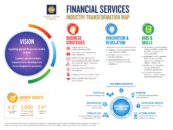
Singapore Fintech Report 2022: Fintech Reaches Critical Mass in Singapore
by Fintech News Singapore January 4, 2022In Singapore, the COVID-19 pandemic has acted as a catalyst for fintech adoption, driving demand for digital payment capabilities, virtual banking experiences and buy now, pay later (BNPL) arrangements.
Consumers and businesses are signing up en masse to digital banking services, local BNPL players are raising massive rounds of funding, and PayNow, Singapore’s instant electronic payment service, is seeing huge volumes of transactions, demonstrating strong uptake of digital payments, a new report by Fintech News Singapore and Alibaba Cloud shows.
The report, titled Singapore Fintech Report 2022, looks at the state of fintech in the city-state, highlighting the key trends and critical developments that occurred over the past year and drawing out what’s to come in 2022.
Singapore Fintech Report 2022: Virtual banking takes off
Our report indicates Singaporean consumers and small and medium-sized enterprises (SMEs) are rapidly embracing virtual banking as banking habits evolve and technology development advances.
Between June and August 2020, customer sign-ups for DBS Bank’s Digibank mobile app rose by 216% year-over-year (YoY). Digibank counts 3.5 million customers.
Local rival Oversea-Chinese Banking Corporation (OCBC) has seen similar growth, reporting that the number of new SME accounts opened online grew 2.4 times in Q1 2020 compared to the previous year.
Likewise, United Overseas Bank (UOB) saw a 406% YoY increase in the online purchase of its investment products in Q1 2020.
Growth in virtual banking usage comes on the back of changing customer expectations and rising demand for digital financial services.
Research conducted by global analytics software firm FICO found that 68% of Singaporean consumers prefer using digital channels to engage with their bank during financial hardship. 28% of consumers indicated preferring to communicate via Internet bank.
Singapore is also preparing for the launch of its first virtual-only banks. The Grab-Singtel consortium, SeaMoney, Ant Group and the Greenland Financial Holdings-led consortium are all working towards becoming operational in 2022.
Singapore Fintech Report 2022: Usage of digital payments accelerates
The growth of online shopping, the move towards cashless payments at brick-and-mortar stores and development in real-time payment are driving a surge in digital payment solutions, especially e-wallets, the report says.
In 2020, e-wallets were the second most popular payment method for e-commerce purchases in Singapore, behind credit cards, according to the 2021 Global Payments Report by FIS. By 2024, e-wallets are expected to overtake credit cards and account for 27% of all online purchase transactions.

Download the Singapore Fintech Report 2022 here
PayNow, Singapore’s peer-to-peer (P2P) fund transfer service running on the Fast And Secure Transfers (FAST) instant interbank payment rail, saw individual registrations rise by 1.6 million in 2020, bringing the total of registrations to 4.9 million. Meanwhile, PayNow Corporate registrations doubled to about 240,000.
In tandem, initiatives to link up Singapore’s national real-time payment system with others in the region are advancing, demonstrating the city state’s leadership in the regional cross-border payment scene.
The linkage of Singapore’s PayNow and Thailand’s PromptPay real-time retail payment systems was successfully launched in April 2021 to facilitate cross-border payments between the two countries. It was followed by linkage with Malaysia’s DuitNow. By July 2022, PayNow is expected to be connected to India’s Unified Payments Interface (UPI) real-time payment system.
Separately, the Monetary Authority of Singapore (MAS) is involved in Project Dunbar, an initiative spearheaded by the Bank for International Settlements (BIS) to use central bank digital currencies (CBDCs) to facilitate cross-border payments.
Singapore Fintech Report 2022: BNPL market heats up
Another booming fintech segment in Singapore is BNPL. BNPL arrangements are a type of short-term financing that allows consumers to make purchases and pay for them in installments.
In Singapore, these products have surged in popularity since the beginning of the pandemic as consumers look to stretch their dollars and online merchants seek to tap into the shift to online channels to boost sales.
Data from a Milleu Insight research found that 30% of Singaporeans aged 25-40 have used a BNPL service. 67% of consumers cited rewards or cashbacks as the top motivators to use BNPL services.
BNPL providers have indicated witnessing significant traction and growth. During the pandemic, Hoolah, one of the most prominent players in Singapore, recorded more than 1,500% growth in transactions and over 800% increase in sales value. Cashback startup ShopBack recently agreed to acquire Hoolah for an undisclosed amount.
In October, Standard Chartered signed a 10-year strategic partnership with Atome Financial, the operator of one of the largest BNPL platforms in Asia. The bank has also committed US$500 million to support Atome Financial expand its group of merchants and customers.
And just last week, Pace, a Singapore-based BNPL solution, closed a massive US$40 million Series A funding round. Pace, which was just launched this year, seeks to hit a gross merchandise value (GMV) run rate of US$1 billion by 2022 and grow its user base by 25 times over the next 12 months. The startup is already looking to expand to Japan, South Korea and Taiwan.

Download the Singapore Fintech Report 2022 here
Singapore Fintech Startup Map 2022
An updated version of the Singapore Fintech Map identifies nearly 500 fintech firms and startups in the city-state.

Download the Singapore Fintech Report 2022 here | See the list of fintech companies and startups in Singapore 2022 here
The blockchain and cryptocurrency segment is the largest category, making up 20% of all fintech companies in Singapore. It’s followed by payments (17%), investment/wealthtech (13%) and regtech (10%).

Fintech companies in Singapore by segment, Source: Singapore Fintech Report 2022, Fintech News Singapore
See the list of fintech companies and startups in Singapore here.






